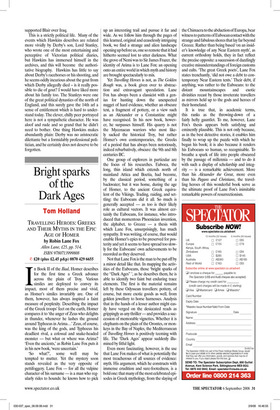Bright sparks of the Dark Ages
Tom Holland
TRAVELLING HEROES: GREEKS AND THEIR MYTHS IN THE EPIC AGE OF HOMER by Robin Lane Fox Allen Lane, £25, pp. 514, ISBN 9780713999808 ✆ £20 (plus £2.45 p&p) 0870 429 6655 In Book II of the Iliad, Homer describes for the first time a Greek advance across the plain of Troy. Various similes are deployed to convey its impact, most of them precise and vivid, as Homer’s similes invariably are. One of them, however, has always inspired a faint measure of perplexity. Describing the impact of the Greek troops’ feet on the earth, Homer compares it to ‘the anger of Zeus who delights in thunder, whenever he lashes the ground around Typhoeus in Arima...’ Zeus, of course, was the king of the gods, and Typhoeus his deadliest rival, a colossal and snake-headed monster — but what or where was Arima? ‘Even the ancients,’ as Robin Lane Fox puts it in his new book, ‘were uncertain.’ ‘So what?’, some well may be tempted to mutter. Yet the mystery soon stands revealed as the very opposite of pettifoggery. Lane Fox — for all the vulpine character of his surname — is a man who regularly rides to hounds: he knows how to pick up an interesting trail and pursue it far and wide. As we follow him through the pages of this learned, original and ceaselessly intriguing book, we find a strange and alien landscape opening up before us, one so remote that it had hitherto seemed lost to utter darkness. What the grove of Nemi was to Sir James Frazer, the identity of Arima is to Lane Fox: an opening onto an entire world in which myth and history are brought spectacularly to mix.
Yet Travelling Heroes is not, as The Golden Bough was, a book given over to abstraction and extravagant speculation. Lane Fox has always been a classicist with a genius for hunting down the unexpected nugget of hard evidence, whether an obscure text, a fragment of pottery, or a view such as an Alexander or a Constantine might have recognised. In his new book, however, he surpasses himself. His quarry is not the Mycenaean warriors who most likely sacked the historical Troy, but rather Homer’s own contemporaries, the Greeks of a period that has always been notoriously, indeed rebarbatively, obscure: the 9th and 8th centuries BC.
One group of explorers in particular are the focus of his researches. Euboea, the long, thin island which extends north of mainland Attica and Boetia, had become, by the classical period, something of a backwater; but it was home, during the age of Homer, to the ancient Greek equivalent of the Vikings. Trading, raiding, and settling: the Euboeans did it all. So much is generally accepted — as too is their likely role as cultural vectors. It was almost certainly the Euboeans, for instance, who introduced that momentous Phoenician invention, the alphabet, to Greece — a thesis with which Lane Fox, unsurprisingly, has much sympathy. It was writing, of course, that would enable Homer’s epics to be preserved for posterity and yet it seems to have spread too slowly for the Euboeans’ own achievements to be recorded as they deserved.
Not that Lane Fox is the man to be put off by a minor detail like that. In mapping the activities of the Euboeans, those ‘bright sparks of the “Dark Ages” ’, as he describes them, he is able to identify two faint but enduring trace elements. The first is the material remains left by these Odyssean travellers: pottery, of course, but more exotic goods as well, from golden jewellery to horse harnesses. Analysis that in the hands of a lesser author might easily have verged on the desiccated reads as grippingly as any thriller — and provides a succession of memorable vignettes. Whether it is elephants on the plain of the Orontes, or monkeys in the Bay of Naples, the Mediterranean of Travelling Heroes is positively teeming with life. The ‘Dark Ages’ appear suddenly illumined by fitful light.
Even more fascinating, however, is the use that Lane Fox makes of what is potentially the most treacherous of all sources of evidence: myth. His argument, which he constructs with immense erudition and sure-footedness, is a bold one: that many of the most celebrated episodes in Greek mythology, from the slaying of the Chimaera to the abduction of Europa, bear witness to patterns of Euboean contact with the strange and fabulous shores that lay far beyond Greece. Rather than being based ‘on an insider’s knowledge of any Near Eastern myth’, as current orthodoxy holds, they in fact reflect the precise opposite: a succession of dazzlingly creative misunderstandings of foreign customs and cults. ‘The great Greek poets’, Lane Fox states trenchantly, ‘did not owe a debt to contemporary Near Eastern texts.’ Their debt, if anything, was rather to the Euboeans: to the distant mountainscapes and exotic divinities recast by those inveterate travellers as mirrors held up to the gods and heroes of their homeland.
It is true that, in academic terms, this ranks as the throwing-down of a fairly hefty gauntlet. To me, however, Lane Fox’s thesis appears both satisfying and eminently plausible. This is not only because, as in the best detective stories, it enables him finally to wrap up the puzzle with which he began his book; it is also because it renders his Euboeans so human, so recognisable. To breathe a spark of life into people obscured by the passage of millennia — and to do it with such a display of scholarship and integrity — is a remarkable achievement. More than his Alexander the Great, more even than his Pagans and Christians, the travelling heroes of this wonderful book serve as the ultimate proof of Lane Fox’s inimitable b_sp_100.06qd 3//0 11 remarkable powers of resurrectionism.


































































 Previous page
Previous page